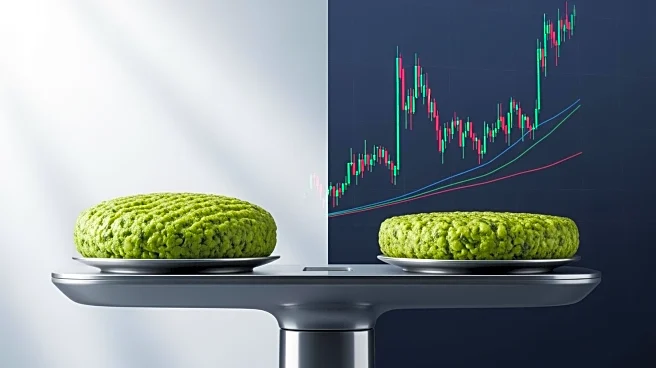What's Happening?
Beyond Meat shares have experienced significant volatility, driven by a surge in meme stock trading. On Tuesday, the company's stock soared by 146% following an announcement of expanded distribution at Walmart
stores. This move triggered a short squeeze, with investors rushing to cover their positions. The stock, which had been under pressure for years, saw a dramatic rise, reaching a high of $7.69 during the session before closing at $3.58. Despite the recent surge, Beyond Meat's shares have been declining steadily since its public debut in 2019, with substantial losses recorded each year. The recent rally is reminiscent of the pandemic-era trading frenzy, where retail traders coordinated aggressive trades on platforms like Reddit's WallStreetBets.
Why It's Important?
The volatility in Beyond Meat's stock highlights the influence of retail traders and meme stock dynamics on market behavior. The resurgence of interest in meme stocks, despite concerns over elevated valuations and potential bubbles, underscores the unpredictable nature of retail-driven market movements. This trend can impact investor sentiment and market stability, as stocks with high short interest become targets for speculative trading. The situation also reflects broader market conditions, where retail investors are increasingly participating in high-risk trades, potentially affecting the valuation of companies and the overall market landscape.
What's Next?
The future of Beyond Meat's stock remains uncertain, as the company navigates the challenges of maintaining investor interest amid fluctuating market conditions. The recent rally may prompt further scrutiny from investors and analysts regarding the sustainability of such trading patterns. Additionally, the broader market may see increased volatility as retail traders continue to engage in meme stock trading, potentially influencing other companies with high short interest. Stakeholders, including institutional investors and market regulators, may need to assess the implications of these trading dynamics on market stability and investor protection.
Beyond the Headlines
The resurgence of meme stock trading raises questions about the ethical and regulatory aspects of retail-driven market movements. The coordination of trades on online platforms can lead to market manipulation concerns, prompting discussions on the need for regulatory oversight. Furthermore, the cultural phenomenon of meme stocks reflects a shift in investor behavior, where social media and online communities play a significant role in shaping market trends. This development may lead to long-term changes in how retail investors approach stock trading and influence market dynamics.








